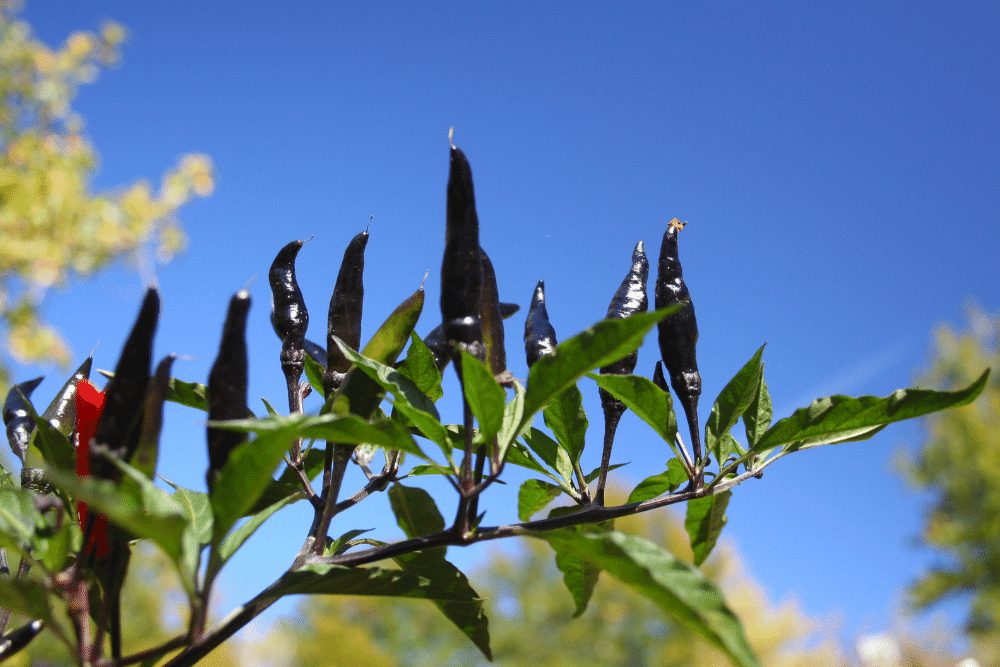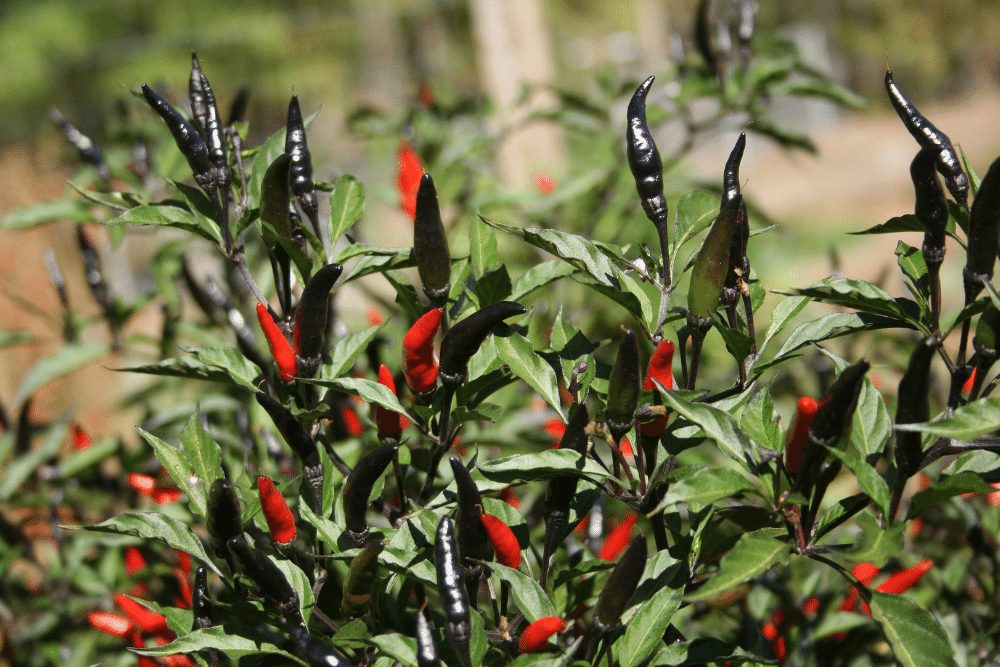Black cobra peppers are heirloom three-color cycle ornamental peppers native to Venezuela. They are famed for their heat, silvery hair, prolificacy, upright fruit growth, and stunning glossy black elongated pods.
What Is A Black Cobra Pepper?
A black cobra pepper is a rare elongated and thin three-color cycle pepper native to Venezuela in South America. It’s also called goat’s weed pepper.
The pepper is famous for its unusual characteristics, such as being the only variety in the Capsicum annuum species to have silvery hair on the leaves and stems.
Black cobra peppers also have a fragrant smell, unlike most other pepper varieties.
Black cobra chile peppers double as hot peppers for cooking and ornamental peppers grown for their unique beauty in home gardens.
The peppers are identifiable by their unusual characteristics in color and growth behavior.

Color
Black cobra peppers start green like most other peppers before ripening to black and finally red. They are more closely associated with black because they have this color for several weeks in the season before they turn red at full ripening.
Shape And Size
Black cobra peppers are relatively small. They are elongated and narrow, with a conical shape that tapers to a pointed tip. The pods are about 3 inches long at full maturity.
The size and shape of goat’s weed peppers are similar to Thai peppers but are shorter and a bit broader at the base.
Texture
Black cobra peppers have smooth, firm, glossy skin with crunchy, aqueous flesh beneath it.
Unusual Growth Behavior
Almost all peppers produce fruits that grow downwards, humbling themselves to the ground. But not black cobra peppers—they are dramatic peppers plants with most fruits growing upright from the stem, reaching into the skies!
The head-raising black cobra pepper fruits grow straight upwards from the stems, showing off their ever-shiny skin and gravity-defying prowess. However, some may grow in the normal down-to-earth position.
Are Black Cobra Peppers Edible?
Black cobra peppers are edible for humans. They are spicy peppers with a marked bitterness and little nuance in flavor.
If you plan to eat them, pair them with sweeter and milder peppers like cubanelles, pimento peppers, aji dulce, Anaheim chilis, California wonder peppers, and Espelette peppers to cancel out the bitterness and heat.
How Spicy Are Black Cobra Peppers?
At 20,000 to 40,000 Scoville Heat Units, black cobra peppers have medium spiciness. They have a nearly similar heat range as Calabrian chilis, which clock 25,000-40,000 SHUs on the Scoville Scale.
The spiciness of the black cobras on the lower end almost equals the heat of the hottest serrano peppers (23,000 SHUs), while the higher end equals the heat of the least hot super chili pepper (40,000 SHUs).
Other medium-heat peppers that generally rival the heat of black cobra peppers include cayenne peppers, tabasco chili peppers, and isot peppers, all clocking 30,000-50,000 SHUs.
Even though black cobras are famed for their heat, they are nowhere near super hot peppers like the Carolina reaper at over 2,200,000 SHUs or Trinidad Moruga Scorpion peppers at 2,009,231 SHUs.
Best Uses For Black Cobra Chilis
Black cobra chilis are usually consumed raw or dried and ground for their heat. The only shortcoming is their overly bitter flavor. Depending on the recipe, you’ll have to use various ingredients to balance the taste.
You can balance bitterness using sweeter peppers, sweet chili sauces, and pastes. Other sweet non-pepper seasonings and herbs will come in handy.
Fruity peppers like chile morita, habaneros, red jalapenos, aji panca, and pasilla chiles are ideal for reducing the black cobra bitterness.
You can use black cobra chilis in ways such as:
- Drying and grinding them into chili powder and flakes.
- Chopping them raw into salsas, sauces, and marinades. You’ll need to cut them open lengthwise and remove the seeds (deseeding them reduces the spiciness).
- Drying and grinding them for blending with sauces and dips
- As a dried spice for srpinkling over soups, flavoring curries, vegetables, and casseroles, or rubbing onto meats such as pork, poultry, and beef.
Where To Buy Goat’s Weed Peppers
Since they are rare, you’ll hardly find goat’s weed peppers grown commercially in the US. They are hard to find in farmers’ markets, supermarkets, and local garden centers.
Your best option is to buy black cobra pepper seeds online from sources like Amazon and grow them in your garden.
Can You Grow Black Cobra Peppers?
You can grow black cobra peppers in outdoor container gardens or your home garden once you buy the seeds online.
Goat’s weed peppers do well in full sun in warm climates with long summers. The longer sun hours help the peppers develop their hotness.
The soil should be well-drained, moist, and rich in organic matter. Stagnant water is a deal-breaker for the peppers.
Once your black cobra hot pepper seedlings develop 4-6 leaves, you can transplant them outdoors in the garden or outdoor growing baskets and containers. Plant the seedlings at least 24 inches apart to minimize nutrient competition.
One thing you’ll love about black cobra chile peppers is their profound beauty, which endears them to ornamental pepper growers. They are likened to other ornamental pepper varieties like black pearl peppers.
Goat’s weed peppers grow from green to black and eventually red. These three colors are often present simultaneously on the same pepper plant and usually coincide with the plant’s white flowers.
These colors work well with the medium-olive green leaves and the silvery white hairs on the leaves and stems. The pepper plants are a sight to behold in your home garden or farmhouse landscape!

